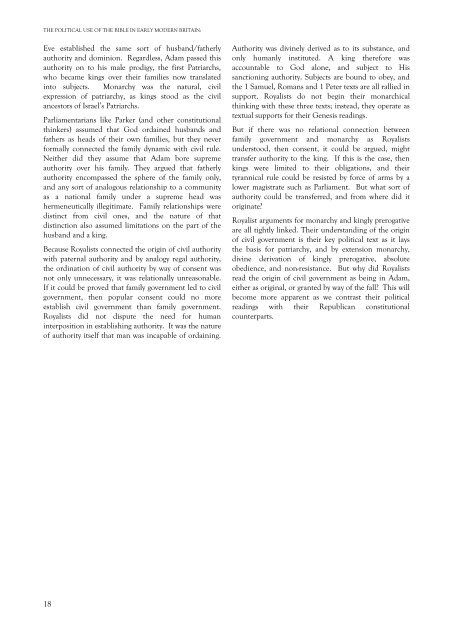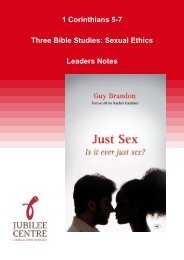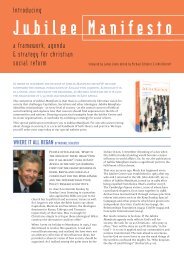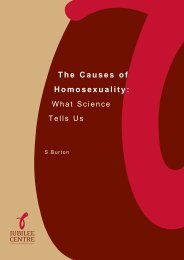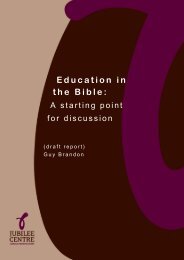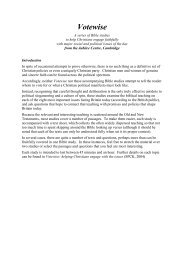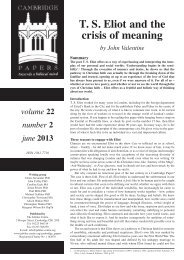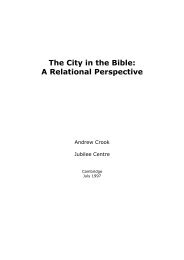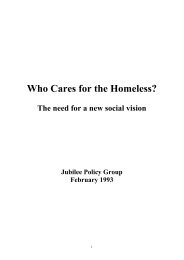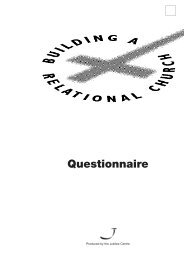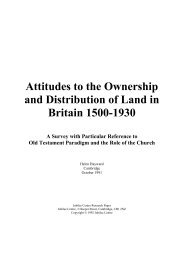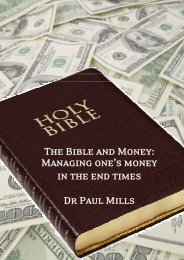Report Template - Jubilee Centre
Report Template - Jubilee Centre
Report Template - Jubilee Centre
Create successful ePaper yourself
Turn your PDF publications into a flip-book with our unique Google optimized e-Paper software.
THE POLITICAL USE OF THE BIBLE IN EARLY MODERN BRITAIN:<br />
Eve established the same sort of husband/fatherly<br />
authority and dominion. Regardless, Adam passed this<br />
authority on to his male prodigy, the first Patriarchs,<br />
who became kings over their families now translated<br />
into subjects. Monarchy was the natural, civil<br />
expression of patriarchy, as kings stood as the civil<br />
ancestors of Israel’s Patriarchs.<br />
Parliamentarians like Parker (and other constitutional<br />
thinkers) assumed that God ordained husbands and<br />
fathers as heads of their own families, but they never<br />
formally connected the family dynamic with civil rule.<br />
Neither did they assume that Adam bore supreme<br />
authority over his family. They argued that fatherly<br />
authority encompassed the sphere of the family only,<br />
and any sort of analogous relationship to a community<br />
as a national family under a supreme head was<br />
hermeneutically illegitimate. Family relationships were<br />
distinct from civil ones, and the nature of that<br />
distinction also assumed limitations on the part of the<br />
husband and a king.<br />
Because Royalists connected the origin of civil authority<br />
with paternal authority and by analogy regal authority,<br />
the ordination of civil authority by way of consent was<br />
not only unnecessary, it was relationally unreasonable.<br />
If it could be proved that family government led to civil<br />
government, then popular consent could no more<br />
establish civil government than family government.<br />
Royalists did not dispute the need for human<br />
interposition in establishing authority. It was the nature<br />
of authority itself that man was incapable of ordaining.<br />
Authority was divinely derived as to its substance, and<br />
only humanly instituted. A king therefore was<br />
accountable to God alone, and subject to His<br />
sanctioning authority. Subjects are bound to obey, and<br />
the 1 Samuel, Romans and 1 Peter texts are all rallied in<br />
support. Royalists do not begin their monarchical<br />
thinking with these three texts; instead, they operate as<br />
textual supports for their Genesis readings.<br />
But if there was no relational connection between<br />
family government and monarchy as Royalists<br />
understood, then consent, it could be argued, might<br />
transfer authority to the king. If this is the case, then<br />
kings were limited to their obligations, and their<br />
tyrannical rule could be resisted by force of arms by a<br />
lower magistrate such as Parliament. But what sort of<br />
authority could be transferred, and from where did it<br />
originate?<br />
Royalist arguments for monarchy and kingly prerogative<br />
are all tightly linked. Their understanding of the origin<br />
of civil government is their key political text as it lays<br />
the basis for patriarchy, and by extension monarchy,<br />
divine derivation of kingly prerogative, absolute<br />
obedience, and non-resistance. But why did Royalists<br />
read the origin of civil government as being in Adam,<br />
either as original, or granted by way of the fall? This will<br />
become more apparent as we contrast their political<br />
readings with their Republican constitutional<br />
counterparts.<br />
18


